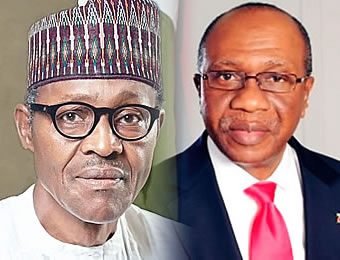Economic Issues
Buhari-Emefiele-Jonathan Recession -By Njoku Ikenna


Sometimes politics takes a toll on us that we forget about the economy. Going by statistics Nigeria is now in a U-shaped recession as informal shorthand economics will make us believe. To many the blame was pushed to a reduced revenue accruing from oil, though a good being that our economy is a monolithic one. Although other factors contributed to the countries widespread drop in spending, triggered by a decline in economic activities with drivers such as consumption, investment, government spending and net export activity nosediving.
Many might differ on the precise dating of a recession onset and end, that of Nigeria is getting prolonged like what japan experienced from 1993-1994, that of Japan was triggered by a stock market decline.Ours was an offshoot of the 2015 budget appropriation bill which gave capital expenditure a mere 9% of the entire budget and a whooping 91% to recurrent expenditure which has to do with (salaries,overheads,statutory transfers and debt service cost). Simply prioritizing govt staffing and wage bills as against the overall health of the economy.
Furthermore in 2015 there were speculations that if oil prices stay at $65 per barrel that there will be more borrowing, if the volume of the crude oil sold falls short of target more borrowing,if the overly optimistic non oil revenue generation target which govt fails to raise successfully falls,govt borrowing spree will continue to meet its obligation.
These speculation actually came through as govt went on to borrow to fund the 2016 budget, although austerity measures were put in place to tighten govt expenditure by closing loopholes that cause revenue losses. First in govt template was the introduction of a single treasury account which made it mandatory that all funds of the federal govt in commercial bank be transfered to the CBN. The results were so devastating been that part of these deposits now to be transfered to the CBN actually served as loans to companies, but due to the policy the loans were no longer thereby causing a reduction in production, prompting those companies to lay off their staff. Given that banks now had less deposits to loan out promoted a hike in interest rate strangulating investors and small businesses propping up the unemployment rate with a severe damage to the GDP causing a decline in economic activities. Faced with a financial crisis,a drop in revenue and the need to borrow,govt was pressured to devalue its currency, divesting in agriculture and non oil sector.
To be fair with govt the financial crisis which was a harbinger of the treasury single account was good intentioned as it meant to stop high level corruption but its speedy, uncalculated and compulsory implementation messed up the whole thing by causing a drop in oil revenue due to a reinsurgence of militancy in the Delta. Furthermore the drop in oil revenue precipitated the devaluation of the Naira in a bid to encourage foreign exchange earning from outside investors to boost local production, rather a few privileged individuals rather than accessing these official exchange and using to boost economics,they ended up selling it in the black market accruing billions to themselves without doing nothing,leaving the poor in the hands of importers who bought these dollars at black market rate, imported raw materials with it thereby causing a price inflation which decreases peoples ability to pay for goods.
Thirdly divesting into agriculture and other non oil is nice but too late as it takes a gradual process before it effects are seen.Lastly govt taxation on one side is meant to increase and on another side is killing small businesses says more that there a conflict in govt economic policy. It creates a scenario where govt tries to curb corruption through TSA and subsequently abetting corruption complete exchange rate system same as that of Venezuela. Though govt seems to be adopting an expansionary monetary policy as well the Keynesian approach of increased spending to move the economy out of recession. In the case that these expansions becomes less effective it should adopt a more supply side approach that tends to cut taxes thereby promoting business capital investment. It should as well reform itself – the national assembly for one should must put a minimum of it 50 billion on the table for poor Nigerians, independent revenue agencies need to double their effort, the PIB must be given acceleration attention and passage, much more the foreign exchange should be allowed to be controlled by market forces to mention but a few.
(Your reactions and comments quite appreciated – 07063993369)



















